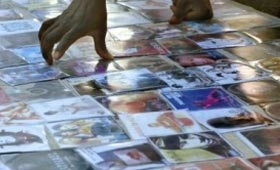The explosive growth in Brazil’s economy over the last decade has produced an insatiable demand for pirated and smuggled goods, and organized crime is reaping the benefit.
Brazil’s federal revenue service reports seizing $812 million worth of illegal consumer goods at airports, seaports, and border crossings in 2011, up 16 percent from 2010. The trend has been rising for several years; a February 2011 report by the National Council to Combat Piracy and Crimes against Intellectual Property (CNCP) showed a three-fold increase in seizures of false, smuggled, and pirated products from 2004 to 2010.
In many cases, counterfeit goods enter Brazil via Paraguay’s Tri-Border Area, a hub of illicit activity, including drugs and weapons trafficking. Smugglers source from a large variety of locations, as far away as China. Once goods are inside Brazil, they are distributed by criminal networks that sometimes span the country.
The smugglers and counterfeiters are driven by Brazil’s booming domestic market, which is hungry for cheaper goods than Brazil’s stiff tariffs and high taxes allow. The Doing Business Project, a subsidiary of the World Bank Group, estimated Brazil’s tax rate to be 67.1 percent of profit, compared to 46.7 percent for the United States. The high tax burden on Brazilian businesses is passed on to consumers, who must also contend with the high tariffs on imported products like electronics and automobiles. This encourages consumers to buy in the informal sector, where goods are cheaper.
In a 2010 survey of Brazilian consumers, conducted by the Rio de Janeiro State Commerce Federation, of the 52 percent of consumers who had not purchased a pirated good that year, only four percent cited fear of prosecution. Of those 48 percent who had, the overwhelming majority (94 percent) said lower prices drove them to buy counterfeits.
The trade in pirated and smuggled goods feeds other types of organized crime in Brazil. According to the CNCP’s 2011 report “the route used by smugglers who traffic pirated products in Brazilian territory is the same used by other criminals to move their products.” The report also notes that up to 20 percent of seizures of pirated or smuggled goods also brought in drugs, guns, or ammunition. This points to links between organized crime and piracy in Brazil, suggesting that the same groups who traffic drugs and arms may also be involved in trafficking contraband goods.
Roberval Ferreira França, a military police colonel, has said that counterfeiting networks in São Paulo state are directly linked with smuggling and drug trafficking, as the Bom Dia Network reports. Rafael Thomaz Favetti, then-president of the CNCP, said in August 2010 that piracy was controlled by organized crime, according to a report by Agencia Brasil.
There is evidence that many smugglers have penetrated the very authorities hunting them. Weeks ago, federal police, arrested five employees of the Revenue Service, along with 15 others, who, together, had been running an international illegal import ring with hubs in at least three different states. The Revenue Service estimated the smuggling ring was responsible for more than $50 million in illegal imports.
In another example of corruption aiding smuggling, authorities in Pernambuco arrested a councilman and four police officers for accepting bribes to allow the safe passage of pirated goods. The five were on an anti-piracy squad. The year-long investigation, in which police also found drugs, weapons, and US and European currency, involved 125 law enforcement agents. The manpower necessary to dismantle a smuggling ring of no more than five people illustrates the difficulty in tackling piracy in Brazil. A study by the Brazil-US Business Council estimated the value of Brazil’s black market of consumer goods at more than $20 billon. This means the port, airport, and border operations of the Federal Revenue Service, the largest source of apprehensions, disrupted less than 5 percent of pirated goods last year.

